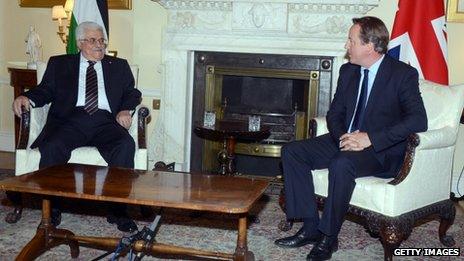Prime minister's belief in Israel 'unbreakable'
- Published
David Cameron: "I come here as a strong friend of Israel"
David Cameron has said his belief in Israel is "unbreakable" while urging the country's politicians to pursue a deal with Palestinians to bring "an end of all conflict".
He told Israelis to imagine "what this land would be like if a two-state solution was actually achieved".
In his first visit to the country as prime minister, Mr Cameron also rejected calls for boycotts of Israel.
He will meet Palestinian Authority President Mahmoud Abbas on Thursday.
Mr Cameron was given a standing ovation as he rose to speak to the Knesset, the Israeli parliament, and joked that it was the "wrong place" to have come if he was looking for a quiet alternative to Prime Minister's Questions, given that Israeli PM Benjamin Netanyahu had been heckled during his opening speech.
'Fully supports' US
Mr Cameron said he felt "some sense of connection" to Israel due to his "relatively limited" Jewish ancestry.
He said: "We all yearn for a lasting and secure peace between Israel and its neighbours.
"Britain fully supports the great work that American Secretary of State John Kerry has been leading. And we believe that in Prime Minister Netanyahu and President Abbas you have leaders who want peace too.
"We back the compromises needed - including the halt to settlement activity and an end to Palestinian incitement too.
"And we recognise the difficult and courageous decisions both sides are taking, not least with Prime Minister Netanyahu's decision to release terrorist prisoners, with all the anguish that can bring for affected families."
As he pushed Israeli MPs to work for a peaceful future, he said the message from Britain was "simply this: we'll be with you every step of the way".
He said he wanted to encourage Israelis to focus on imagining "what this land would be like if a two-state solution was actually achieved".
"Imagine Israel - like any other democratic nation - finally treated fairly and normally by all," he added.
He said that peace would not only bring security, but also deliver "extraordinary" economic benefits for the Israeli and Palestinians by enabling them to work together and forge international trade and business links.
He also rejected calls for boycotts of Israel,
"Britain opposes boycotts. Whether it's trade unions campaigning for the exclusion of Israelis or universities trying to stifle academic exchange, Israel's place as a homeland for the Jewish people will never rest on hollow resolutions passed by amateur politicians.
"It is your destiny. Delegitimising the state of Israel is wrong. It's abhorrent. And together we will defeat it."

The prime minister has also hosted Mr Abbas at Downing Street
On the subject of Iran, Mr Cameron said he was "not starry-eyed" about the new regime and that Britain would ensure Iran was never allowed to build a nuclear weapon.
At a news conference later, Mr Netanyahu called Mr Cameron's "moving" speech a "powerful affirmation" of the two countries' relationship.
When questioned about Mr Cameron's comments about halting settlement activity, the Israeli prime minister said: "Good friends, even family members, can agree on most things and disagree on a few things. The settlement issue is one that will have to be resolved in peace negotiations."
He also reiterated his desire to make sure that Iran does not have access to nuclear weapons.
In front of the assembled members of the press Mr Cameron condemned rocket attacks from Gaza which Mr Netanyahu had referred to in his opening remarks of the news conference.
'Competitive edge'
Mr Cameron, who last visited Israel as opposition leader in 2009, is leading a 17-strong UK business delegation seeking to encourage links between technology and innovation sectors in the UK and Israel.
The visit comes at a sensitive time in efforts to secure a lasting agreement between the Israelis and Palestinians.
The US has said it hopes to get the backing of both sides for a framework document addressing the most contentious issues around the "two-state solution" sought by the international community.
Unresolved issues include:
The borders between Israel and a future Palestinian state
The status of Jerusalem
Israel's insistence that it be recognised as a Jewish state
The Palestinians' demand that their refugees be allowed to return to their former homes in what is now Israel
Security arrangements in the West Bank.
There has been little sign of progress since July, when direct talks resumed after a three-year hiatus.
The Palestinians suspended the last round of talks in 2010 after a 10-month partial moratorium on settlement construction expired.
The European Union is Israel's largest trading partner as well as the biggest donor to the Palestinian Authority.
Mr Cameron has hosted both Mr Netanyahu and Mr Abbas in Downing Street since 2010.